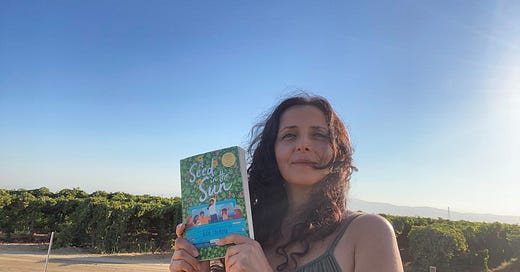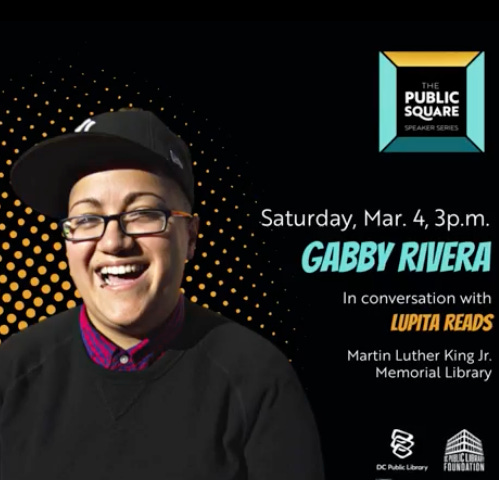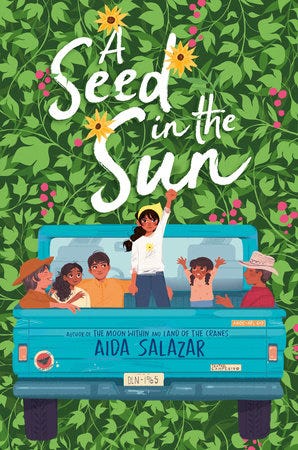#NuevasPaginasconLupita is a space that is both an archive and resource aimed to "spotlight" Hispanic/Latinx/e authors with newly published books. The goal is to connect readers to new and/or old favorite Hispanic/Latinx/e authors and their books! So give this & every post a share to help us reach more readers!
How does it work?!
Here’s the deal, I came up with a set of casual/random/funny questions to ask each Hispanic/Latinx/e author, I interview. For now, the questions will all be the same but maybe in the future I’ll launch this into more specific questions to the author or maybe I’ll turn this series into a mini-podcast, or maybe……well, you get it! The possibilities are endless.
If you are new here don’t forget to check out all the other amazing interviews! We also have a great line-up of guest authors coming up so make sure you don’t miss an issue by subscribing now!
A friendly reminder that I am an affiliate with Bookshop.org and I may earn a commission if you click through any book links and make a purchase.
Hey Heyyy Book Franz!
I know I typically land in your inbox on Tuesdays but my days got mixed up and somehow the month of February is almost over?! WHAT IN THE WORLD?! Well, I have some super exciting news about March.
If you live near DC, I’ll be in conversation with THE Gabby Rivera, author of Juliet Takes a Breath and author of the Marvel series America, which features America Chavez: a queer Latine superhero! We’ll be talking about all things joy Saturday, March 4th at 3 PM at the Martin Luther King Jr Memorial Library and I truly hope you’ll consider joining us if you can.
Also in March, you can catch me chatting virtually from anywhere in the world Tuesday, March 9th at 6:30 pm ET via Loyalty Books, with Malka Older and C.L. Polk! Both have new books out and both books feature SAPPHIC characters!!!! So you know we’ll be getting into all things science/fantasy fiction and writing about lady-loving in space. Register here to join us.
For #LupitasBookClub Besties:
HA! Would you believe it if I told you I looked at the calendar and did not realize that February 18th came and went?! Y’ALL I TOTALLY DID NOT POST DISCUSSION QUESTIONS WHEN I SAID I WOULD. I am truly the worst but also life - I got sick and the days meshed together not to mention hosting a book club on a platform that only shows your videos to your own audience if they go viral (yes, I’m throwing shade at you TikTok), makes it really hard to engage folks to join a book club which, therefore, makes it hard for me to stay engaged. That I said I really want to keep trying to make this happen even if I forget to post discussion questions on discussion day! If you read with us this month - the questions to WHEN WE WERE SISTERS by Fatimah Asghar are coming STAT and if you didn’t read with us, you can always play catch up. The discussion questions stay on this site. You can access them anytime.
Without further ado, our very special guest author for today’s Nuevas Pagina issue is……Aida Salazar author of A Seed in the Sun!
Could you tell me a bit about where this photo was taken? Is it special to your book in some way?
This picture was taken as the sun was rising on a vineyard near Delano in California’s fertile Central Valley. These miles and miles of farmland are said to provide two thirds of the fruits and vegetables for the entire nation. It is on a grape field like this with the Sierra Nevada mountain range in the distance where dozens of first Filipino farmworkers then Mexican and other farmworkers began their struggle for fair wages and working conditions in 1965 in Delano.
This is when and where my book, A SEED IN THE SUN, is set. History and the present cannot be untangled – the same demands are made of the earth and of those who toil over the land today as they were fifty-seven years ago. The climate crisis has exacerbated workers’ conditions with extreme heat, smoke from wildfires and drought. Though the UFW (United Farmworkers Union) has made significant gains in improving labor conditions for our most essential workers, there are still many places that are just as exploitative to farmworkers as they were back then.
Tell me about your book without telling me about your book - share any literary inspirations behind your book! If there are none, the gap you wanted to fill in the literary canon with your book.
A SEED IN THE SUN is an offering in verse rooted in activism, political theater, justice, and hope. It leads with the Mexican proverb “They tried to bury us but they didn’t know we were seeds.” It is a calling, especially to girls and women, to find and raise your voice despite the most adverse conditions, for yourself and others, even if you think you don’t have a voice. In twelve-year-old Lula’s story you will find many seeds, taking root and growing tall, up from the ground, determined to touch the sun.
There has never been a novel for children about the pivotal moments of the United Farmworker’s 1965 Delano Grape Strike and it is arguably one of the most important labor justice movements in US history! Filipinx and Chicanx communities who were at the forefront of organizing have not seen this history reflected in literature. My editor, Nancy Mercado, approached me to write this book to fill this space for young readers and educators. Though the story is fictional, it was incredibly important to me that the novel be as historically accurate as possible. I hope more historical novels about this important struggle will be written but for now, this humble offering is a start.
What are two central themes in your book that you connect with the most and why?
As a poet, when someone mentions the concept of a theme, I translate this as metaphor or imagery. Naturally, the theme that most inspired me is found in the book’s title A SEED IN THE SUN. I thought of Lula as a seed, carrying all her possibility within and if given the right conditions having the ability to flourish. I used images and metaphors of the seed’s life cycle, what is needed for it to grow – earth, water, light, air, sun – through the entire book. It was so inspiring to have Lula’s story be grounded in that metaphorical process and then to layer it with deeper meaning by drawing on things that hinder a seed’s or person’s growth, like pesticides, or patriarchy, or drought. I see children as seeds, with their powerful potential intact, despite being handed terrible circumstances. I hope to help cultivate in them, through my writing, a few elements that will give them the strength to survive, bear fruit, and hopefully offer solutions to help heal the mess we’ve made of the world.
Another important theme is the often-unrecognized contributions of women and children in the success of the movement. Though history would have us believe otherwise, Dolores Huerta, Helen Chavez, Esther Urunday and countless other women farmworkers were at the forefront of many actions. Though they were not given leadership roles, their work as negotiation strategists, organizers, picketers, and support workers like nurses, secretaries, donations managers, cooks and childcare providers helped to sustain the movement. In my research, I looked carefully and read between the lines to find mentions of women and girls and almost always it was clear how impactful their contributions were though they weren’t given credit. I constructed scenes in the novel often from a single line in a primary source. In one such instance, a male writer documenting the first one hundred days of the struggle said Dolores Huerta had pulled hundreds of people out of the fields to join the strike and he said nothing else about her. Till that moment, no one had been able to do such a thing but he didn’t recognize the greatness of that phenomenal act. Of course, I took that one line and built a scene where Lula sees this action in real-time and is blown away by Dolores’ power. I intentionally wrote this story from a girl’s perspective, a girl who challenged the patriarchal thinking that dominated her own family and the time.
If a book was home, where would your home be?
It would be in a housing barrack in Delano, California. A one-room shack with bedbugs and no running water where a farm-working family lives and where despite the scarcity of resources, they love and dream, cry and resist, and strategize to lift up one another with a song, a laugh, a glimmer of esperanza again and again. In the book, (spoiler alert) Lula’s family is kicked out of their barrack. Lula’s mother, Mamá, says to Lula and her sister. “We are migrant farmworkers, home is where we grow it together.”
If your book was a famous musician who would it be?
My main character, Lula, sings! She would grow up to be a superstar mix of three musicians — Joan Baez, Lydia Mendoza, and Paquita la del Barrio. She would have Joan’s grander social justice consciousness with Lydia’s expertise entertaining migrant laborers in the fields and Paquita’s feminist critique of life. Her top hit would be a ranchera mash-up of “We Shall Overcome” with “Mal Hombre” and “Las Mujeres Mandan”.
What comfort food could a reader pair with your book?
Organic UFW-certified grapes! Though really, almost everything we put in our mouths to nourish us was grown from the earth. Oh, and also, an herbal tea prepared from wild yerbas given to you by your local curandera.
In what ways has access (or little to no access) to Hispanic/Latinx/e literature defined you as a writer?
Reading US-based Latine writers like Helena María Viramontes, Rudy Anaya, and Sandra Cisneros in a Latin American literature class for the first time in 1990 when I was a college student transformed me. I went from someone who secretly wrote poetry and stories in her journal to someone who believed that they could be a professional writer. That experience both validated me and gave me permission to write our lives into existence in literature regardless of the many efforts to silence or erase our stories. I’ve come to understand that writing is an act of self-determination, a spiritual act, a revolutionary act, to depict our lives on our own terms with creativity and truth so as to unveil the brilliant spectrum of our humanity. Wanting to give others, especially Latine children, that transformative and radical experience is part of why I write.
Where can readers keep up with your work?
You can find me on most platforms @aida_writes. I post an update almost every week more or less depending on what I’ve got brewing. Though often, you will find my posts are a mix of literary work, or activism, and personal stuff. The world is at turns devastating and beautiful and I can’t help but scream or write about it.
Thank you to Aida for taking the time to chat with me about her book! Please please make sure you purchase a copy (or request your local library carry a copy) #SupportLatinxLit!
Aida Salazar is an award-winning author and arts activist whose writings for adults and children explore issues of identity and social justice. She is the author of the critically acclaimed middle-grade verse novels The Moon Within and Land of the Cranes, as well as the picture book anthology In the Spirit of a Dream: 13 Stories of American Immigrants of Color. Aida is a founding member of Las Musas--a Latinx kidlit debut author collective. She lives with her family of artists in a teal house in Oakland, CA.
Synopsis for A Seed in the Sun from the Bookshop website:
A farm-working girl with big dreams meets activist Dolores Huerta and joins the 1965 protest for workers' rights in this tender-hearted novel in verse, perfect for fans of Rita Williams-Garcia and Pam Muñoz Ryan.
Lula Viramontes aches to one day become someone whom no one can ignore: a daring ringleader in a Mexican traveling circus. But between working the grape harvest in Delano, California, with her older siblings under dangerous conditions; taking care of her younger siblings and Mamá, who has mysteriously fallen ill; and doing everything she can to avoid Papá's volatile temper, it's hard to hold on to those dreams.
Then she meets Dolores Huerta, Larry Itliong, and other labor rights activists and realizes she may need to raise her voice sooner rather than later: Farmworkers are striking for better treatment and wages, and whether Lula's family joins them or not will determine their future.










